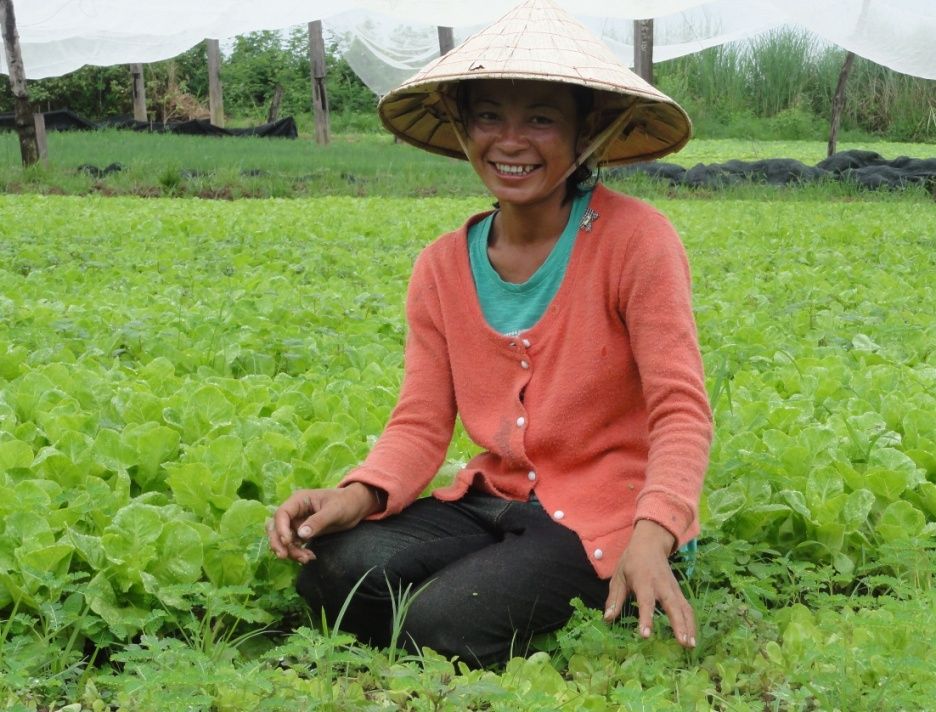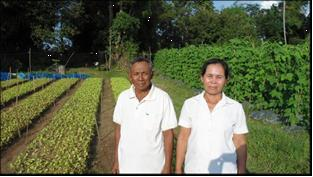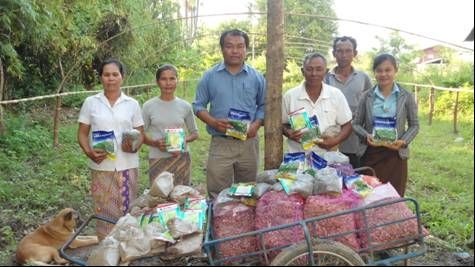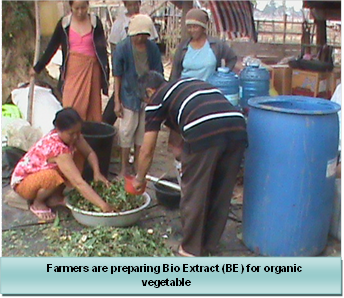Promoting organic vegetable production in Laos
 | ||
Organic vegetable grower |
The Sustainable Natural Resource Management and Productivity Enhancement Project started in January 2010 is supported by an IFAD grant of USD 15 million and an ADB (Asian Development Bank) grant of USD 20 million. The project is operating in 42 districts of 5 southern provinces of Lao People’s Democratic Republic (Lao PDR) and is responding to the problem of the use of pesticides by farmers. Farmers are being encouraged to adopt organic vegetable production technology, including the use of organic pesticides and natural predators to control insects, and the preparation of organic compost fertilizer.
The increased value of and demand for vegetable products encouraged farmers of Champasak and Savanakhet provinces to increase their production substantially. Unfortunately, many of them resorted to indiscriminate use of pesticides, which can result in serious food safety problems for consumers as well as personal health hazards for farmers who come in direct contact with the pesticides while applying them in the fields. Moreover, it poses a potential risk of contaminating the soil and the waterways, which are the major source of drinking water for the population residing in the region.
In response, the Sustainable Natural Resource Management and Productivity Enhancement Project (SNRMPEP), funded by IFAD and ADB, was designed to encourage farmers to adopt organic vegetable production technology. With technical support from Ministry of Agriculture & Forestry (MAF) provincial staff, SNRMPEP has established three organic vegetable production groups (55 farmers) in Pakse, Phonethong and Sukhuma districts of Champasak province, and one group (11 farmers) in Phak Kha village of Kaisonephumvihan district of Savanakhet province.
A Model Organic Farmer Family The family started farming rice in 1993 with some use of chemicals, and average annual income was approximately 1 million Kip (USD 300). In 2011, he learned about SNRMPEP and decided to join. As one of the pilot farmers, he received support from the project through the District Agriculture & Forestry Office (DAFO) to produce organic fertilizer and construct sheds to grow organic vegetable. He also attended training programmes and exposure visits to learn more about organic vegetable cultivation. The project team and DAFO staff provided regular technical support and advice along with seeds for new varieties of vegetables like lettuce, shallots, cucumbers, long-beans, water spinach and coriander. Mr Sithon is very happy with his decision and the support the project provided. Before the project, his income was about USD 1,700 and out of this he would spend about USD 500 on chemical fertilizers and pesticides. After the project interventions his average annual income increased to USD 2,450 and his expenditure to buy the fertilizer and chemical pesticides was eliminated. He spends only USD 200 to buy some raw material to produce the organic fertilizer and pesticides. He is also pleased that his land, water and soil are becoming more productive and free from health hazards. His wife is also satisfied that the rice and vegetables grown in their fields are completely safe and not adversely affecting the health of the consumers. She is very keen to share their experiences with other farmers. | ||
|
The farmers were trained to use organic pesticides and natural predators to control insects, and to prepare their own organic compost fertilizer. Considering that a typical farmer cultivates 1600 square metres of vegetables, there are now about 9 hectares of land on which organic technology is being practiced. In the pilot activities being carried out, the farmers decide for themselves the vegetables they will cultivate, depending on market demand.
 | ||
A model organic farmer family – Mr Sithon Duangpaseuth and his wife |
Since the project’s inception in January 2010 yields during the dry season have been extremely encouraging, with 4.2 tons of organic vegetables produced (mostly for the local market), earning more than 31 million Kip (USD 3900) per family in just one planting season. Before the project, farmers used to earn about 16 million Kip (USD 2000), and part of this they spent to buy the chemical fertilizers and chemical pesticides.
Eleven small farmers of Phak Ka village of Kaison Phomvihan districts have established 22 greenhouses on 1 hectare of land to cultivate organic vegetables. Farmers have developed a rapid composting method. This is a farmers’ innovation and they use locally available raw material like cattle dung, rice husk, rice straw and weeds mixed with locally produced Effective Micro-organism (EM) Culture and are able to produce high-quality compost within ten days. They have produced 20 tons of compost and 600 litres EM in a three-month period, which are applied over 4 hectares of rice and 1 hectare of vegetables. The quality of the vegetables they produce is very good and traders are buying their vegetables at farm gate. This is the first successful model for organic vegetable production in Savanakhet province. The model serves as learning ground for many farmers in the area, and collaboration with the private sector is underway to supply the organic vegetables to domestic and international markets.
 | ||
Members of an organic vegetable grower group with DAFO staff preparing the seed to grow in gardens |
With the successful results in this pilot phase, SNRMPEP plans to continue supporting organic agriculture by supplying farmers with inputs and technology, including a new, improved variety of cultivars that not only yield better but have higher resistance to diseases and pests. SNRMPEP also organized a fair in Pakse to raise consumer awareness about the benefits of organic vegetables and farming practices. The overwhelming response from the consumers has further prompted the SNRMPEP to continue supporting the various awareness campaigns on food safety and health advantages of organic agriculture to local consumers. Support has taken the form of market demonstrations and information bulletins. The campaigns have also inspired other farmers to take up organic vegetable production, which is increasingly being seen as a healthier and more profitable business in the province.
 |
The project is looking at ways to replicate activities in other areas of Champasak, Attapeu and Savanakhet provinces. The strategy is to coordinate with the private sector to export organic vegetables to other countries, which will further increase farmers’ incomes and spur economic growth of the region. There is also a plan for large-scale adoption by farmers in other areas of the three provinces. The farmers have formulated the plan, in which SNRMPEP, working with the Department of Agriculture, will implement three sub-projects for large-scale uptake of organic vegetable production in the three provinces and accessing national and international markets.
This green technology is clearly a “triple win” solution – for the health of the environment, the farmers and the consumers.
Mr Vinoth Vansy, National Project Director, SNRMPEP, Department of Planning, Ministry of Agriculture and Forestry
Dr Kulwant Singh, Team Leader, Project Implementation Consultant, SNRMPEP, Department of Planning, Ministry of Agriculture and Forestry
Useful links
'庫間 > 해외자료' 카테고리의 다른 글
| 누가 중국을 먹여 살릴 것인가? 농기업이냐 자국의 농민이냐 (0) | 2012.08.07 |
|---|---|
| 아르헨티나 법원은 제초제의 사용에 주목한다 (0) | 2012.08.07 |
| 방글라데시에서 활용하는 녹색기술 (0) | 2012.08.07 |
| 간수성에서 물 절약 기술로 수확량을 2배로 (0) | 2012.08.07 |
| 세계는 식량이 아니라 물이 부족하다 (0) | 2012.08.07 |
